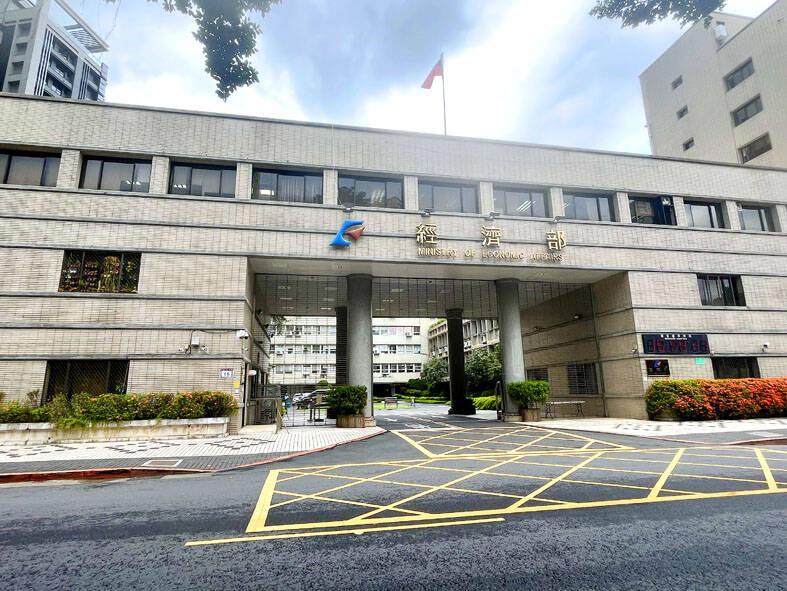Amendments passed by the Legislative Yuan in May to impose harsher punishment for economic espionage took effect yesterday.
The changes to the National Security Act (國家安全法) and the Act Governing Relations Between the People of the Taiwan Area and the Mainland Area (臺灣地區與大陸地區人民關係條例) were made to protect Taiwan’s core technologies.
The amendment to the latter act prohibits Chinese companies or Chinese-funded entities based outside China from engaging in business activities in Taiwan without government approval.

Photo: Liao Chia-ning, Taipei Times
Offenders could face up to three years in prison and fines of up to NT$15 million (US$481,232). Previously, maximum penalties were one year in prison and NT$150,000.
Additionally, those who allow Chinese-funded businesses to use their name to operate in Taiwan could face fines ranging from NT$120,000 to NT$2.5 million under the new amendments.
The law also stipulates that people commissioned by central agencies to engage in businesses involving Taiwan’s core technologies would need government approval to travel to China.
The approval process is to be drafted by the National Science and Technology Council, which is communicating with local industries and is to announce the related regulations once they are ready, sources said.
To correspond with the amendment, the Ministry of Economic Affairs proposed a change to the Regulations Governing the Permission of Establishing Branches or Agencies in Taiwan by Commercial Enterprise in the Mainland Area (大陸地區之營利事業在台設立分公司或辦事處許可辦法) and the passed amendment was announced on Thursday.
The regulationd have been renamed the Regulations Governing the Permission of Establishing Branches or Representative Offices in Taiwan by a Commercial Enterprise in the Mainland Area or a Commercial Enterprise It Invested In a Third Area (大陸地區之營利事業或其於第三地區投資之營利事業在台設立分公司或辦事處許可辦法).
Branches or offices set up directly by Chinese-funded businesses or indirectly through an entity outside of Taiwan or China would be considered “Chinese-funded businesses,” the ministry said.
Additionally, companies outside of Taiwan or China that receive more than 30 percent of their funding from Chinese businesses, or in which Chinese businesses hold more than 30 percent of the shares, would be considered “Chinese-funded businesses,” it added.
The regulations also stipulate that such branches or offices are banned from engaging in research and development activities to prevent China from poaching talent from Taiwan and protect national security.
The amended regulations limit such business activities to collecting, organizing and analyzing data related to market surveys.
Companies and offices that have not completed registration in Taiwan cannot conduct business in the country, it says.

The US government has signed defense cooperation agreements with Japan and the Philippines to boost the deterrence capabilities of countries in the first island chain, a report by the National Security Bureau (NSB) showed. The main countries on the first island chain include the two nations and Taiwan. The bureau is to present the report at a meeting of the legislature’s Foreign Affairs and National Defense Committee tomorrow. The US military has deployed Typhon missile systems to Japan’s Yamaguchi Prefecture and Zambales province in the Philippines during their joint military exercises. It has also installed NMESIS anti-ship systems in Japan’s Okinawa

‘WIN-WIN’: The Philippines, and central and eastern European countries are important potential drone cooperation partners, Minister of Foreign Affairs Lin Chia-lung said Minister of Foreign Affairs Lin Chia-lung (林佳龍) in an interview published yesterday confirmed that there are joint ventures between Taiwan and Poland in the drone industry. Lin made the remark in an exclusive interview with the Chinese-language Liberty Times (the Taipei Times’ sister paper). The government-backed Taiwan Excellence Drone International Business Opportunities Alliance and the Polish Chamber of Unmanned Systems on Wednesday last week signed a memorandum of understanding in Poland to develop a “non-China” supply chain for drones and work together on key technologies. Asked if Taiwan prioritized Poland among central and eastern European countries in drone collaboration, Lin

The Chien Feng IV (勁蜂, Mighty Hornet) loitering munition is on track to enter flight tests next month in connection with potential adoption by Taiwanese and US armed forces, a government source said yesterday. The kamikaze drone, which boasts a range of 1,000km, debuted at the Taipei Aerospace and Defense Technology Exhibition in September, the official said on condition of anonymity. The Chungshan Institute of Science and Technology and US-based Kratos Defense jointly developed the platform by leveraging the engine and airframe of the latter’s MQM-178 Firejet target drone, they said. The uncrewed aerial vehicle is designed to utilize an artificial intelligence computer

Renewed border fighting between Thailand and Cambodia showed no signs of abating yesterday, leaving hundreds of thousands of displaced people in both countries living in strained conditions as more flooded into temporary shelters. Reporters on the Thai side of the border heard sounds of outgoing, indirect fire yesterday. About 400,000 people have been evacuated from affected areas in Thailand and about 700 schools closed while fighting was ongoing in four border provinces, said Thai Rear Admiral Surasant Kongsiri, a spokesman for the military. Cambodia evacuated more than 127,000 villagers and closed hundreds of schools, the Thai Ministry of Defense said. Thailand’s military announced that